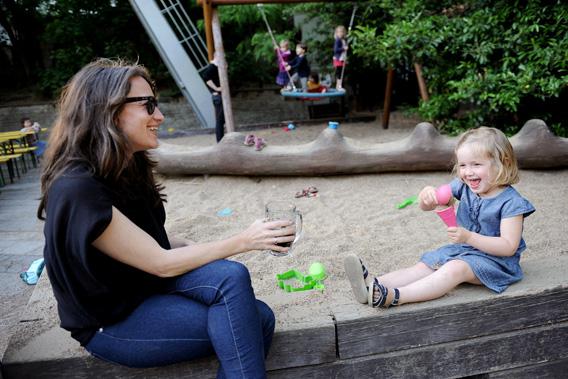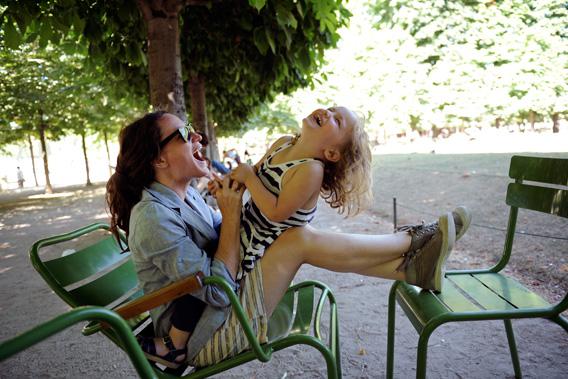Dahlia is home sick from school. She’s dancing in a tutu from my second grade recital, its orange, green, and pink ruffles now rediscovered and tugged over her monkey pajamas. At her insistence (and my pleasure), I too am wearing a tutu—a can-can skirt I saved from junior high, pulled up over my jeans. She twirls and jumps between the pocket doors to our bedroom. I tell myself to remember this. Then I look at the clock, remember the workday is in full swing, and scramble up to check my email.
There I see a note from a demographer; if I can call him now, he’s free for an interview. I bellow downstairs for Justin to abandon the paperwork he’s doing in favor of the next installment of Nutcracker mice and scurry out to my office clutching my frilled skirt around me. I dial up Philip Morgan at the Carolina Population Center, eager to hear his analysis of the recent study he conducted on our cultural notions of ideal family size. He parses a bevy of numbers that all add up to his summary that nobody wants just one kid, not anywhere, not even in Europe, where fertility rates have plummeted.
I explain to him that I am an only child by design and that the small child prancing in a tutu in my house may well be one too. “Listen, no offense to your mother or to yourself,” he says, “but I had three sons and I’m glad they have brothers. One of the most enjoyable things I did as a parent was to watch my kids interact with one another, hanging out, seeing them as adults interacting.” I am silent. He continues, “I can’t imagine having just one child. What would that be like? Their relationships with each other have been the greatest joy of my life.”
I get it. I do. All I have to do is see our friends’ kids—plural—playing together, caring for each other, sharing a secret language. All I have to do is watch Dahlia’s joy and tenderness when she gets to hold their baby brothers and sisters. Justin sees it too, and he knows what she’s missing. But he reminds me often how the sacrifices we’d need to make to raise another child would impact Dahlia’s happiness—not to mention our own.
A 2007 Pew survey found that at a rate of nearly three to one, people believe the main purpose of marriage is the “mutual happiness and fulfillment” of adults rather than the “bearing and raising of children.” Pew also found that only 41 percent of today’s adults see parenthood as very important to a successful marriage, down from 62 percent in 1990. If anything, it can be a detriment. The University of Chicago’s Linda Waite, whose research focuses on how to make marriages last, tells me, “You’re better off to ignore your kids and focus on your relationship than to focus on your kids and ignore your relationship,” which she says few people have the courage to do. Instead, she says, we do the opposite. “Kids, kids, kids. That’s how we forget about our own needs—it’s all about them. And no one is happy like that.”
Robin Simon of Wake Forest University surveyed well-being data from 13,000 respondents and, in a 2005 issue of the Journal of Health and Social Behavior, published her findings that adults with children experience depression and unhappiness in greater numbers than nonparents. That’s regardless of class, race, or gender. Simon understands this phenomenon as a ruthless combination of social isolation, lack of outside support, and the anticipation of the overflow of bliss that we believe is the certain outcome of every birth. “Our expectations that children guarantee a life filled with happiness, joy, excitement, contentment, satisfaction, and pride are an additional, though hidden, source of stress for all parents,” she wrote in Contexts magazine, adding, “negative emotions may also lead parents with children of all ages, especially mothers, to perceive themselves as inadequate since their feelings aren’t consistent with our cultural ideal.” Right on, sister.
I find that parenting offers an untold bounty of happiness, joy, excitement, contentment, satisfaction, and pride—just not all the time. Each child is an additional source of pride, sure, but also an additional infringement on freedom, privacy, and patience. I can understand why Jean Twenge, in a study on parenthood and marital satisfaction, found that happiness in a marriage tumbles with each additional child. This finding bears out worldwide and not just in the United States. Demographer Mikko Myrskylä discovered that in some regions, like southern Europe, happiness was also significantly higher among parents with one child. At a demographic conference, Myrskylä tells me about the immense pleasure he takes in his two children—though he’s known to put in longer hours at work these days, he says, since it feels “like a holiday” after being at home.
At that conference, a young researcher named Anna Baranowska presents a paper giving additional heft to the finding that one child may maximize personal happiness. The first child tends to spike happiness in a parent, she declared, while every subsequent child lowers it. In fact, social scientists have surmised since the 1970s that singletons offer the rich experience of parenting without the consuming efforts that multiple children add: all the miracles and shampoo mohawks but with leftover energy for sex and conversation. The research of Hans-Peter Kohler, a professor of demography at the University of Pennsylvania, and Jere Berman, a professor of economics, gives weight to that idea. In their much-discussed analysis of a survey of 35,000 Danish twins, women with one child said they were more satisfied with their lives than women with none or more than one. As Kohler tells me, “At face value, you should stop at one child to maximize your subjective well-being.”
***
At a recent gathering of single-child families in New Jersey, the selfish question comes up. Every woman at the table—some of whom had gone to expensive, debilitating lengths to conceive again—recounts being accused of selfishness by family members and strangers alike for not having a second child. Not a single man can offer up an equivalent story. One, a salesman in a pink oxford shirt and tie, says with smirking self-awareness, “Why would anyone say anything to me? I’m the father.” Mothers are the ones who face the accusation. Both fathers and mothers pay dearly for the miracle of parenthood, but in most cases, it’s women who pony up for the bulk of those costs.
The morning following that dinner in New Jersey, the Census Bureau released a report on who provides care for our children. Suzanne Bianchi, who clocked in 16 years as a census demographer, discovered, stunningly, that mothers actually spend more time caring for a child today than they did in 1965, back when 60 percent of them stayed home full-time. In her book Changing Rhythms of American Family Life, Bianchi wrote that married mothers devote about 13 hours a week to child care, up from about 10 1/2 hours nearly a half century ago. Additionally, she wrote, women still do twice as much housework as men.
I know how unmanageable it all is with just one child. And I know how, when I mention this, people with two (or more) shoot disdainful looks in my direction, as if I’m bitching about my permanent vacation. “It’s like hearing a skinny person complain about looking fat, and I don’t want to hear it,” one mother of two once snapped at me. There’s no doubt about it: They have it harder. Much harder. Yet I’ve heard plenty of people tell me they think it’s easier with siblings. “They take care of each other,” they say on good days. I yearn for that missing element in my own home, not just for the pleasure of seeing Dahlia play with a little brother or sister, but for the moments of freedom it would allow me. But just as often, on bad days I hear, like I did from a friend last week, “Forget what I said about how they take care of each other. They’re at war, my house is a mess, and I’m losing my mind.”

Photo courtesy of Justin Lane
While it’s tough to measure the exact hours of sibling conflict a parent must referee, there exists some data to measure how much tougher each additional kid can be. At the University of Michigan, Frank Stafford runs the Panel Study of Income Dynamics, which is essentially a time diary that measures quantifiable aspects of our multitudinous lives. One category he follows is housework. He finds this category so clear and reliable that he uses it as the example when teaching people how to read his complex tables. What he has learned is that this “labor in its most naked state” increases dramatically with each child introduced into a household. Each child adds no less than 120 hours of housework a year. No wonder those mothers of siblings can’t stomach my complaints.
But the issue today isn’t as simple as washing sippy cups and dirty socks, or even the sheer number of hours we spend away from our friends and our thoughts. As the demands of the workplace have expanded to swallow up our lives, clashing with our consuming love affair with our children, parenting has simultaneously morphed into something grotesquely extended beyond traditional ideas of care. It’s hard to imagine how anyone can find time to make a living. Or read a newspaper. Or have a conversation with one’s partner about anything but what errands need to be done, who is covering pickup or making dinner.
“Why am I in traffic on Rockville Pike going to a Chuck E. Cheese birthday party for my whole Saturday? Because if everyone else’s kid is doing it, your kid has to do it too,” says Carol Graham, who researches happiness and family at the Brookings Institution and who was raised in Peru by a Swiss mother. Both her research and personal experience suggest that emphasis on children is one of the major differences between families in America and those in other countries. “It’s become a complete rat race. A million activities, practices every night.”
We may not have the time or energy to organize and participate in movements for social change, or even read the newspaper, but we can bake organic cupcakes and supervise algebra homework and spend our lives driving from soccer to ballet and watch Nick Jr. in our media rooms. All that overparenting seems selfless for a reason: Parents are literally losing themselves. Our communities and democracy are losing them too. Imagine if all that devotion wasn’t just directed inward to the family, but outward into the world? It’s hard to, isn’t it? The world can sound and look remarkably hazy from inside a domestic cocoon.
What my mother needed to be a happy person is not what all mothers need. She needed to feel she was making a significant contribution through her work, and not just her family, working for more than the necessary paycheck. She needed to live somewhere where she could walk a few blocks to buy a really good cookie when she got the craving after dinner. She needed to travel, to make her marriage as significant as her motherhood, to be able to go supermarketing and pick up the dry cleaning without being outnumbered by her kids, plural, who were performing the theater of rivalry in the produce section. I remember errands without another kid to help me make my case that carob was not the same as chocolate. I had no yard to play in. Was I a happy kid? Sure. Was she a happy mother? I think so.
This article is excerpted from One and Only by Lauren Sandler. Copyright © 2013 by Lauren Sandler. Reprinted by permission of Simon & Schuster, Inc.
